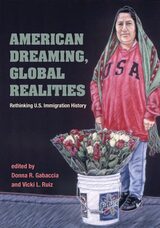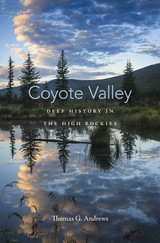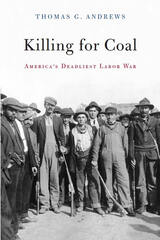
An introduction to the best from the new directions in U.S. immigration history
Representing a selection of the finest new research on immigration, American Dreaming, Global Realities explores the ways in which immigrant lives and those of their children are shaped by transnational bonds, globalization, family ties, and personal choice, and the ways in which they engender a sense of belonging and a sense of themselves as “Americans.”
American Dreaming, Global Realities considers a plurality of very specific historical, economic, regional, familial, and cultural contexts. This history reveals resistance and accommodation, both persistent older traditions and Americanization, plus the creation of new cultural forms blending old and new. The twenty-two interdisciplinary essays included in this collection explore the intricate overlapping of race, class, and gender on ethnic identity and on American citizenship.

What can we learn from a high-country valley tucked into an isolated corner of Rocky Mountain National Park? In this pathbreaking book, Thomas Andrews offers a meditation on the environmental and historical pressures that have shaped and reshaped one small stretch of North America, from the last ice age to the advent of the Anthropocene and the latest controversies over climate change.
Large-scale historical approaches continue to make monumental contributions to our understanding of the past, Andrews writes. But they are incapable of revealing everything we need to know about the interconnected workings of nature and human history. Alongside native peoples, miners, homesteaders, tourists, and conservationists, Andrews considers elk, willows, gold, mountain pine beetles, and the Colorado River as vital historical subjects. Integrating evidence from several historical fields with insights from ecology, archaeology, geology, and wildlife biology, this work simultaneously invites scientists to take history seriously and prevails upon historians to give other ways of knowing the past the attention they deserve.
From the emergence and dispossession of the Nuche—“the People”—who for centuries adapted to a stubborn environment, to settlers intent on exploiting the land, to forest-destroying insect invasions and a warming climate that is pushing entire ecosystems to the brink of extinction, Coyote Valley underscores the value of deep drilling into local history for core relationships—to the land, climate, and other species—that complement broader truths. This book brings to the surface the critical lessons that only small and seemingly unimportant places on Earth can teach.

On a spring morning in 1914, in the stark foothills of southern Colorado, members of the United Mine Workers of America clashed with guards employed by the Rockefeller family, and a state militia beholden to Colorado’s industrial barons. When the dust settled, nineteen men, women, and children among the miners’ families lay dead. The strikers had killed at least thirty men, destroyed six mines, and laid waste to two company towns.
Killing for Coal offers a bold and original perspective on the 1914 Ludlow Massacre and the “Great Coalfield War.” In a sweeping story of transformation that begins in the coal beds and culminates with the deadliest strike in American history, Thomas Andrews illuminates the causes and consequences of the militancy that erupted in colliers’ strikes over the course of nearly half a century. He reveals a complex world shaped by the connected forces of land, labor, corporate industrialization, and workers’ resistance.
Brilliantly conceived and written, this book takes the organic world as its starting point. The resulting elucidation of the coalfield wars goes far beyond traditional labor history. Considering issues of social and environmental justice in the context of an economy dependent on fossil fuel, Andrews makes a powerful case for rethinking the relationships that unite and divide workers, consumers, capitalists, and the natural world.
READERS
Browse our collection.
PUBLISHERS
See BiblioVault's publisher services.
STUDENT SERVICES
Files for college accessibility offices.
UChicago Accessibility Resources
home | accessibility | search | about | contact us
BiblioVault ® 2001 - 2024
The University of Chicago Press









